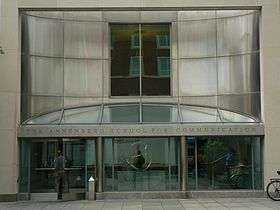Annenberg School for Communication at the University of Pennsylvania
- There are multiple Annenberg Schools. For the communications school at USC, see USC Annenberg School for Communication and Journalism. See also Annenberg (disambiguation).
 | |
| Type | Private |
|---|---|
| Dean | Michael X. Delli Carpini, Ph.D. |
| Location | Philadelphia, Pennsylvania |
| Campus | Urban |
| Affiliations | University of Pennsylvania |
| Website | http://www.asc.upenn.edu/ |

The Annenberg School for Communication is the communication school at the University of Pennsylvania. The school was established in 1958 by Wharton School's alum Walter Annenberg as The Annenberg School of Communications. The name was changed to its current title in the late 1980s.
Walter Annenberg described the mission of the school in the following words:
"Every human advancement or reversal can be understood through communication. The right to free communication carries with it responsibility to respect the dignity of others – and this must be recognized as irreversible. Educating students to effectively communicate this message and to be of service to all people is the enduring mission of this school."[1]
Over the years, the school has grown to become the top school for communication in the country,[2] and one of the most prestigious institutions for communication internationally. The current dean of the Annenberg School for Communication at the University of Pennsylvania is Michael X. Delli Carpini.
The Annenberg School for Communication is also home to FactCheck, an award-winning nonprofit that monitors the factual accuracy of political statements. Factcheck, and the then Dean of the school, Dr. Kathleen Hall Jamieson, attracted nationwide attention during the 2004 U.S. presidential election.
Academics
Originally, The Annenberg School offered only M.A. and Ph.D. degrees. However, in the fall of 1976, Annenberg began offering an undergraduate major for the University of Pennsylvania. The undergraduate major in communication consists of 14 courses, 11 in communication and 3 in other departments, selected by students according to their interests. The school also offers many internship, study abroad, and public service opportunities, and encourages interdisciplinary study.
Annenberg's M.A. program was discontinued in the 2000s, so that students who apply to the school's graduate program can only apply for a Ph.D. The Ph.D. program runs for 5 years, during which students are encouraged to do field research and study abroad.
The Annenberg School for Communication houses several centers and projects with branches and partnerships in many different countries in the world:
- Annenberg Public Policy Center
- Adolescent Risk Communication Institute
- Annenberg Classroom
- Annenberg Political Fact Check
- Student Voices
- National Annenberg Election Survey 2008
- Leonore Annenberg Scholarship and School Funds
- Center of Excellence in Cancer Communication Research
- Center for Global Communication Studies
- Annenberg Children and Media Lab
- Institute for Public Service
Rankings
The Annenberg School for Communication ranks first in its field.[2] The National Research Council ranks the school among the top five communication doctoral programs in the nation,[3] while the National Communication Association Doctoral Reputation Study ranked the school's Ph.D. program in the areas of Critical-Cultural Communication, Health Communication, Mass Communication, and Political Communication the best in the country.[4]
Notable faculty
- Oscar H. Gandy, Jr. (retired, 2006), Herbert Schiller professor of Communication studies
- Kathleen Hall Jamieson, professor of communication, and Director of the Annenberg Public Policy Center
- Elihu Katz, American-Israeli sociologist, and winner of the UNESCO-Canada McLuhan Prize
- Klaus Krippendorff, professor for cybernetics, and creator of the Krippendorff's Alpha coefficient
- Monroe Price, media scholar, and former Dean of the Benjamin N. Cardozo School of Law
- Richard J. Stonesifer, president of Monmouth University
- Christopher Yoo, professor of Law, Communication and Computer Information Science
See also
References
- ↑ http://www.asc.upenn.edu/about/Mission.aspx
- 1 2 "The 20 Best Schools for Communications Majors in 2009 - College Crunch". collegecrunch.org.
- ↑ http://www.asc.upenn.edu/news/NewsDetail.aspx?nid=751&ntype=main
- ↑ "NCA - Page Not Found" (PDF). natcom.org.
External links
- Official website
- The Annenberg School for Communication at the University of Pennsylvania webpage on The Annenberg Foundation website
